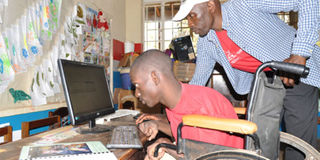Schools yet to act on inclusive ICT labs

Schools have been given up to next year to make their ICT facilities inclusive to all learners despite their impairments. File photo
With effect from next year, every school in the country must put in place facilities and equipment for learners with special needs to access information communications and technology services, the Uganda Communications Commission (UCC) has said.
The announcement was made by Nyombi Thembo, the director for Rural Communication and Development Fund (RCDF), in Gulu Town recently.
RCDF is a department of the UCC created to enable access to basic ICT services among the unserved and underserved persons in the country.
According to Nyombi, 1,300 government schools across the country have been provided with ICT (computer) laboratories under RCDF programme but a baseline survey conducted last year indicated that only a small fraction of disabled learners were accessing the facilities.
Mandatory
“Every ICT lab should be accessible for learners using wheelchairs. ICT is becoming a human right and inclusivity is key,” he said.
He said each school should also set aside a fraction of computers and other ICT equipment for disabled and special needs leaners only.
“Every computer lab must ensure that 10 per cent of the seats are reserved for persons with disabilities. For example; when we give a school 40 computers, four must be reserved for persons with disabilities,” he stated. This, Nyombi says, will enable the country to understand and embrace challenges learners with special needs face.
The need
Every year, UCC draws two (2) per cent of the gross annual revenue percentage realised from all telecom firms and invests into RCDF as part of an effort to enhance ICT learning in schools across the country.
But Daniel Odoch, a special needs instructor and teacher at Gulu High School in Gulu District, urged government to increase the grant given to schools to ease procurement of necessary equipment for the learners.
“Many learners with disabilities in our schools will miss out on life-changing education opportunities because the grant is too small to enable us buy braille, build rams, among other equipment to support learners with disabilities,” Odoch said.
Since the inception of the universal primary and secondary education, government has encouraged inclusivity for all learners in primary and secondary schools.
However, these learners, according to Pamela Angwech, a board member at UCC, remain marginalised and not properly integrated into inclusive education.




